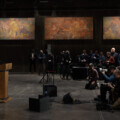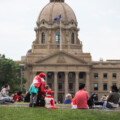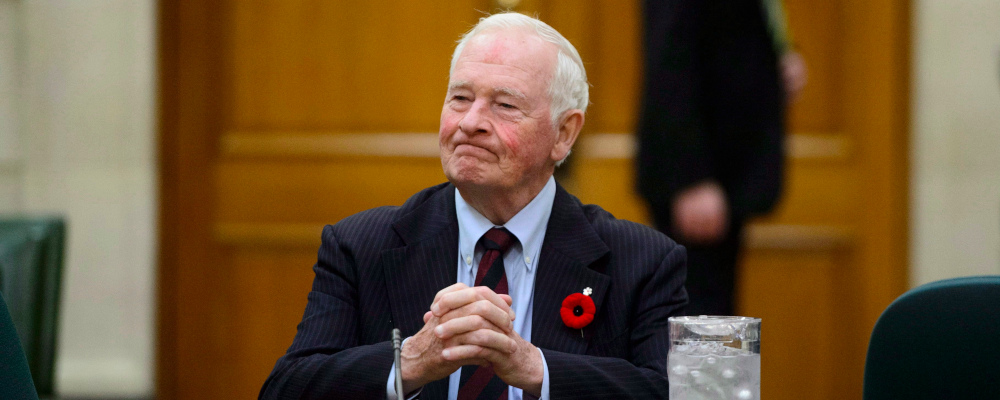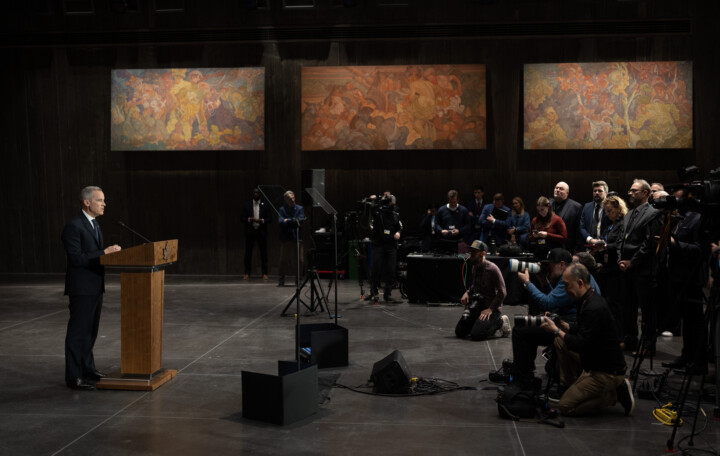The highly anticipated report on allegations of Chinese foreign interference in Canada’s elections from special rapporteur David Johnston is finally here, and its dramatic conclusion—no need to call a public inquiry, actually—raised eyebrows in Ottawa and the hackles of opposition politicians across the country. Pierre Poilievre called it a “cover-up”, Yves-François Blanchet claimed “the regime in China is celebrating,” and Jagmeet Singh expressed how “deeply disappointed” he was and pledged to “use all our tools in Parliament to get answers for Canadians.”
Here at The Hub, we have assembled a handful of our top contributors for their instant reactions to the report and its implications.
David Johnston was the wrong man for the job
By Howard Anglin
Prime Minister Trudeau put David Johnston in an impossible situation, but somehow he still managed to make it worse. His report into the federal government’s response to PRC interference in Canadian politics confirmed what was obvious to apparently everyone but Trudeau and himself: that he was not the right person for the job.
He was the wrong choice not (only) because of his long-standing friendship with Trudeau’s family, but because he does not possess the skill set to investigate the problem effectively. In his press conference, Johnston defended his qualifications as a former law professor, university administrator, and member of several federal and provincial inquiries. It’s all very impressive, and irrelevant.
I wrote at the time of Johnston’s appointment that Trudeau should have opted for a “retired intelligence mandarin or ex-cabinet minister” from one of our Five Eyes partners. Someone like this or this. This is because a proper assessment of the threat and the adequacy of Canada’s response requires someone with a deep practical knowledge of electoral politics and/or of foreign security and intelligence work. Johnston has neither.
Perhaps that is why the report’s general tone is one of genial credulity. Time and again Johnston notes an allegation, hints at the very real possibility of foreign interference—a stated intent to interfere, evidence of disinformation, a compromised politician—and then just lets it go. In virtually every case, it turns out that the responsible agency, board, or panel was unable to confirm the allegation. In other cases, he repeats the reassuring conclusion of a subsequent report by yet another government insider that everything worked just fine.
Now, it may be the case that every one of our federal intelligence agencies, boards, committees, and rapid response panels is doing a bang-up job. But I wouldn’t just take their word for it, as Johnston seems content to do. Johnston’s report never once questions their work or the quality of the evidence they provided him. If they say there’s insufficient evidence, that’s the answer. He never asks if it’s a good enough answer. His conclusions are those of a reporter, not a rapporteur.
In the end, Johnston says that subject deserves a further “public process, but not a Public Inquiry,” which “should focus on strengthening Canada’s capacity to detect, deter and counter foreign interference.” And then he appoints—surprise!—himself to carry out that job. That continuing lack of self-awareness alone is disqualifying.
Johnston’s oversight was anything but independent
By Rahim Mohamed
The (rather anticlimactic) findings of special rapporteur David Johnston’s first report on Chinese election meddling are further proof that a small, incestuous clique of Laurentian insiders exercise altogether too much control over our nation’s politics—extending even to the putatively “independent’ oversight of government. Johnston, who once literally lived next door to the Trudeaus in Laurentian cottage country (you can’t make this stuff up), and more recently took a volunteer position with the Trudeau Foundation, should have known better than to accept the highly sensitive job of special rapporteur to begin with. His first report will give little comfort to those who were already skeptical about his impartiality.
Bizarrely, Johnston reserves his strongest rhetoric for the members of the intelligence community who leaked details of the Chinese interference to the press, writing, “It is a matter of urgency that all efforts be made to identify and hold the leaker(s) responsible. Malice cannot be ruled out.”
Somewhat buried in the report is confirmation of the allegation that former Liberal MP Han Dong, the politician at the centre of the scandal, “discussed the “two Michaels (Kovrig and Spavor)” with a PRC official—presumably without obtaining the go-ahead from Foreign Affairs or the PMO beforehand. This alone is a serious transgression that places Mr. Dong’s fitness to continue on as an MP in question.

Even more concerning are the details former Conservative party Erin O’Toole has shared about his meeting with the special rapporteur last week. O’Toole wrote via Substack that the perfunctory, last-minute meeting left him “with the clear impression that my meeting was nothing more than a box checking exercise”; adding that Johnston told him mid-discussion that his report was already being translated to French (implying that the bulk of it had already been written). O’Toole, who has announced that he will be stepping away from politics at the end of the current legislative session, has no political incentive to misrepresent the details of his meeting with Johnston. His account is highly credible and should be taken as strong evidence of the slapdash, haphazard nature of this process.
Johnston has recommended against a full public inquiry into Chinese election interference; but his evident lack of professionalism may, in fact, justify a subsequent investigation into his conduct as special rapporteur.
‘Just trust us’ justice
By Joanna Baron
At his press conference today, David Johnston engaged in more hand-wringing over the CSIS leakers than over the actual bad actors from Beijing who, it is common ground, attempted to interfere in our political process. His remarks bore an unpleasant trace of deja-vu with another argument that Canadians have been clobbered with lately: that the facts at the core of the question are simply too sensitive and would present too much danger to air out publicly.
This was the tactic the Trudeau government took at last fall’s Public Order Emergency Commission: the legal opinion that allegedly formed their entire basis for acting, and other pertinent discussions, could not be approached from a seeming ten-mile radius without threatening solicitor-client privilege. It made any answer to a deeply important question—what was the PM thinking when he invoked the Act?—void of meaning.
Back then and now, there are ways in which a free society can ask difficult questions and tread on sensitive terrain while preserving state secrets. In court cases concerning national security, an amicus curiae, a security-cleared lawyer acting as an impartial friend of the court, is often appointed. Such a role could be adapted for the purpose of a public inquiry into the interference allegations: government claims of privilege could be reviewed on an expedited basis with the participation of amici. Parliament should not relent in its demand for a public inquiry.
Recommended for You

‘An embarrassing moment for Canadians’: Noah Shack on Mark Carney’s counterproductive statement on Israel

Peter Menzies: With mainstream media in bed with the Liberals, Canada needs independent journalism more than ever

Catharine Kavanagh: Independent schools are a huge positive for Alberta—if only the government can live up to its promises

Need to Know: How serious is the Alberta separatism question?



